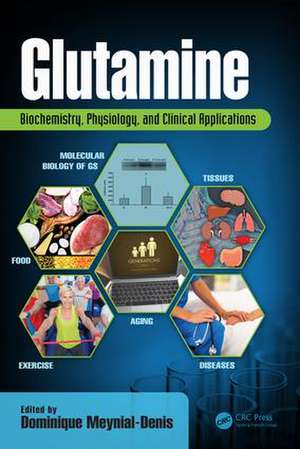Glutamine: Biochemistry, Physiology, and Clinical Applications
Editat de Dominique Meynial-Denisen Limba Engleză Hardback – mar 2017
The contributors are either pioneers or experts in the area of Gln from all around the globe, including Australia, Brazil, Canada, Europe, China, and the United States. This book is a valuable source of information for nutrition scientists, medical doctors, sports scientists, food scientists, dietitians, and anyone interested in nutrition. It is also a valuable resource for students in these fields and will be an important addition to university libraries.
Preț: 1098.67 lei
Preț vechi: 1333.36 lei
-18% Nou
Puncte Express: 1648
Preț estimativ în valută:
210.25€ • 219.23$ • 174.74£
210.25€ • 219.23$ • 174.74£
Comandă specială
Livrare economică 27 februarie-13 martie
Doresc să fiu notificat când acest titlu va fi disponibil:
Se trimite...
Preluare comenzi: 021 569.72.76
Specificații
ISBN-13: 9781482234299
ISBN-10: 1482234297
Pagini: 412
Ilustrații: 74
Dimensiuni: 178 x 254 mm
Greutate: 0.88 kg
Ediția:1
Editura: CRC Press
Colecția CRC Press
ISBN-10: 1482234297
Pagini: 412
Ilustrații: 74
Dimensiuni: 178 x 254 mm
Greutate: 0.88 kg
Ediția:1
Editura: CRC Press
Colecția CRC Press
Public țintă
Academic and Professional ReferenceCuprins
Basics of Glutamine Metabolism. New Data on the Biochemistry of Glutamine. Molecular and Cellular Aspects of Glutamine Metabolism. Glutamine, the Brain and Neurological Diseases. Glutamine and the Intestinal Tract. Glutamine and the Catabolic State. Glutamine, Immunity and Exercise. Glutamine and Aging.
Descriere
Glutamine: Biochemistry, Physiology, and Clinical Applications describes the different functions of glutamine (Gln) in animals and humans. Gln is both a nutrient and a signaling molecule, and its functions go beyond those of a simple metabolic fuel or protein precursor. This book has gathered together, in an unbiased and critical manner, all the available evidence and research on Gln including pathology (neurological diseases, intestinal diseases, critical illness, and cancer), physiology (successful aging), catabolic states, immunity, and exercise. Special attention is given to the potential benefit of Gln in states of insulin resistance and the role of Gln as a "conditionally essential" amino acid.
